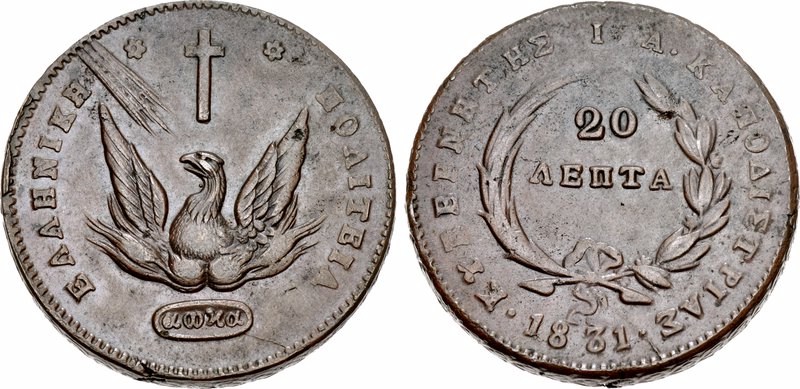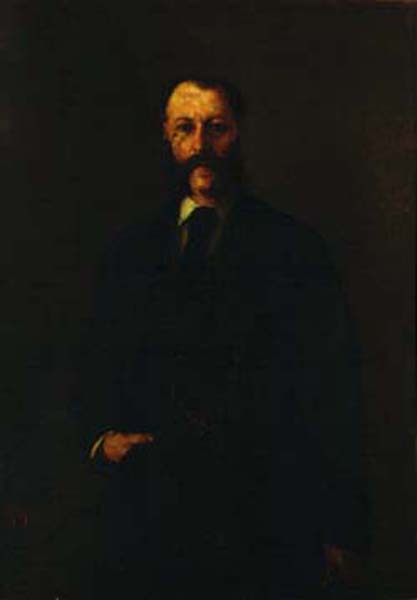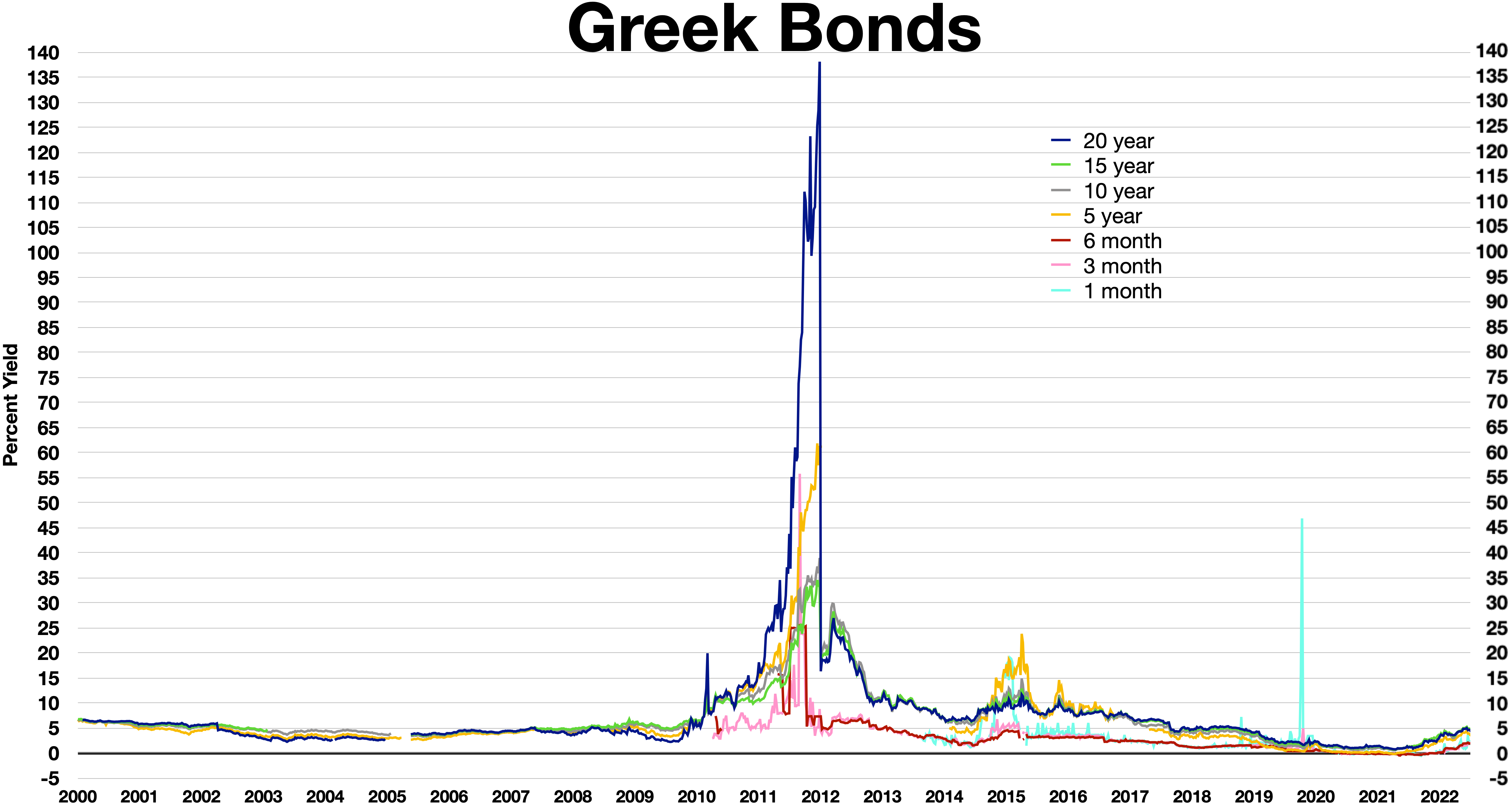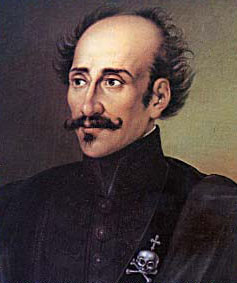|
Phoenix (currency)
The ''phoenix'' (, ''foinix'') was the first currency of the modern Greece, Greek state. It was introduced in 1828 by Governor Count Ioannis Kapodistrias and was subdivided into 100 ''Greek lepton, lepta''. The name was that of the mythical Phoenix (mythology), phoenix bird and was meant to symbolize the rebirth of Greece during the still ongoing Greek War of Independence. The ''phoenix'' replaced the Ottoman Empire, Ottoman ''kuruş'' (called ''Groschen, grosi'' γρόσι, plural γρόσια ''grosia'' by the Greeks) at a rate of 6 phoenixes = 1 ''kuruş''. Introduction The creation of a national currency was one of the most pressing issues for the newborn Greek state, so that the monetary chaos reigning in the country could subside. Prior to the Phoenix's introduction, transactions were settled with a wide variety of coins, including the ''kuruş''; coins from major European states, such as France, Britain, Russia and Austria, were also popular. Therefore, minting the ''p ... [...More Info...] [...Related Items...] OR: [Wikipedia] [Google] [Baidu] |
Aegina
Aegina (; ; ) is one of the Saronic Islands of Greece in the Saronic Gulf, from Athens. Tradition derives the name from Aegina (mythology), Aegina, the mother of the mythological hero Aeacus, who was born on the island and became its king. Administration Municipality The municipality of Aegina consists of the island of Aegina and a few offshore islets. It is part of the Islands (regional unit), Islands regional unit, Attica (region), Attica region. The municipality is subdivided into the following five communities (population in 2021 in parentheses): * Aegina (6,976) * Kypseli (2,166) * Mesagros (1,473) * Perdika (847) * Vathy (1,449) The regional capital is the town of Aegina, situated at the northwestern end of the island. Due to its proximity to Athens, it is a popular vacation place during the summer months, with quite a few Athenians owning second houses on the island. The buildings of the island are examples of Neoclassical architecture with a strong folk element, bu ... [...More Info...] [...Related Items...] OR: [Wikipedia] [Google] [Baidu] |
Alexandros Kontostavlos
Alexandros Kontostavlos (; c. 1789, Chios – 1865, Athens) was a Greek banker, magnate and politician. Biography Konstavlos was born on the island of Chios in about 1789 and descended from a noble family that traced its origins to the Byzantine Empire. After studies in Italy, he became a member of the Filiki Etaireia and during the latter part of the Greek Revolution served as an envoy to the United States for the purchase of warships. In 1828, Governor Ioannis Kapodistrias named him a member of the financial committee and sent him to Malta, where he purchased the mint that was used to produce the first modern Greek currency, the '' Phoenix''. Under King Otto of Greece, he was elected several times to Parliament for Karystos, and served as Minister of Finance on 5 October 1855 – 2 July 1856. From December 1856 to July 1856, he was Speaker of the Hellenic Parliament The President of the Hellenic Parliament is the presiding officer of the Parliament of Greece. The presid ... [...More Info...] [...Related Items...] OR: [Wikipedia] [Google] [Baidu] |
1828 Establishments In Greece
Eighteen or 18 may refer to: * 18 (number) * One of the years 18 BC, AD 18, 1918, 2018 Film, television and entertainment * ''18'' (film), a 1993 Taiwanese experimental film based on the short story ''God's Dice'' * ''Eighteen'' (film), a 2005 Canadian dramatic feature film * 18 (British Board of Film Classification), a film rating in the United Kingdom, also used in Ireland by the Irish Film Classification Office * 18 (''Dragon Ball''), a character in the ''Dragon Ball'' franchise * "Eighteen", a 2006 episode of the animated television series ''12 oz. Mouse'' Science * Argon, a noble gas in the periodic table * 18 Melpomene, an asteroid in the asteroid belt Music Albums * ''18'' (Moby album), 2002 * ''18'' (Nana Kitade album), 2005 * '' 18...'', 2009 debut album by G.E.M. * ''18'' (Jeff Beck and Johnny Depp album), 2022 Songs * "18" (5 Seconds of Summer song), from their 2014 eponymous debut album * "18" (One Direction song), from their 2014 studio album ''Four'' ... [...More Info...] [...Related Items...] OR: [Wikipedia] [Google] [Baidu] |
Economic History Of Greece
The economic history of the Greek World spans several millennia and encompasses many modern-day nation states. Since the focal point of the center of the Greek World often changed it is necessary to enlarge upon all these areas as relevant to the time. The economic history of Greece refers to the economic history of the Greece, Greek nation state since 1829. Earliest Greek civilizations Cycladic civilization Cycladic civilization is the earliest trading center of goods. It was extensively distributed throughout the Aegean region. Minoan civilization The Minoan civilization emerged on Crete around the time of the early Bronze Age, it had a wide range of economic interests and was something of a trade hub, exporting many items to mainland Greece as well as the Egyptian Empire of the period. The Minoans were also innovators, developing (or adopting) a system of lead weights to facilitate economic transactions. Despite this Minoan civilization remained, for the most part, an agricu ... [...More Info...] [...Related Items...] OR: [Wikipedia] [Google] [Baidu] |
Modern Obsolete Currencies
Modern may refer to: History *Modern history ** Early Modern period ** Late Modern period *** 18th century *** 19th century *** 20th century ** Contemporary history * Moderns, a faction of Freemasonry that existed in the 18th century Philosophy and sociology * Modernity, a loosely defined concept delineating a number of societal, economic and ideological features that contrast with "pre-modern" times or societies ** Late modernity Art * Modernism ** Modernist poetry * Modern art, a form of art * Modern dance, a dance form developed in the early 20th century * Modern architecture, a broad movement and period in architectural history ** Moderne, multiple architectural styles ** Modernisme a.k.a. Catalan Modernism * Modern music (other) Geography *Modra, a Slovak city, referred to in the German language as "Modern" Typography * Modern (typeface), a raster font packaged with Windows XP * Another name for the typeface classification known as Didone (typography) * Modern ... [...More Info...] [...Related Items...] OR: [Wikipedia] [Google] [Baidu] |
Currencies Of Greece
A currency is a standardization of money in any form, in use or circulation as a medium of exchange, for example banknotes and coins. A more general definition is that a currency is a ''system of money'' in common use within a specific environment over time, especially for people in a nation state. Under this definition, the British Pound sterling (£), euros (€), Japanese yen (¥), and U.S. dollars (US$) are examples of (government-issued) fiat currencies. Currencies may act as stores of value and be traded between nations in foreign exchange markets, which determine the relative values of the different currencies. Currencies in this sense are either chosen by users or decreed by governments, and each type has limited boundaries of acceptance; i.e., legal tender laws may require a particular unit of account for payments to government agencies. Other definitions of the term ''currency'' appear in the respective synonymous articles: banknote, coin, and money. This article uses ... [...More Info...] [...Related Items...] OR: [Wikipedia] [Google] [Baidu] |
King Of Greece
The Kingdom of Greece was ruled by the House of Wittelsbach from 1832 to 1862 and by the House of Glücksburg from 1863 to 1924 and, after being temporarily abolished in favor of the Second Hellenic Republic, again from 1935 to 1973, when it was once more abolished and replaced by the Third Hellenic Republic. Only the first King, Otto, King of Greece, Otto, was actually styled ''Basileus#Modern Greece, King of Greece'' (). His successor, George I of Greece, George I, was styled ''King of the Hellenes'' (), as were all other modern Greek monarchs. The Greek monarchy was definitively abolished weeks before the 1973 Greek republic referendum, referendum in 1973 conducted under the auspices of the then-ruling Regime of the Colonels, military regime, which confirmed the abolishment. It was re-confirmed by 1974 Greek republic referendum, a second referendum in 1974, after the metapolitefsi, restoration of democratic rule. House of Wittelsbach The London Conference of 1832 was an ... [...More Info...] [...Related Items...] OR: [Wikipedia] [Google] [Baidu] |
Otto Of Greece
Otto (; ; 1 June 1815 – 26 July 1867) was King of Greece from the establishment of the Kingdom of Greece on 27 May 1832, under the Convention of London, until he was deposed in October 1862. The second son of King Ludwig I of Bavaria, Otto ascended the newly created throne of Greece at age 17. His government was initially run by a three-man regency council made up of Bavarian court officials. Upon reaching his majority, Otto removed the regents when they proved unpopular with the people, and he ruled as an absolute monarch. Eventually, his subjects' demands for a constitution proved overwhelming, and in the face of an armed (but bloodless) insurrection, Otto granted a constitution in 1843. Throughout his reign, although Otto tried to make significant reforms to modernize Greece, seeing himself as Enlightened absolutist, establishing educational Institutions and several state services, he was unable to resolve Greece's major part of poverty and prevent economic meddling ... [...More Info...] [...Related Items...] OR: [Wikipedia] [Google] [Baidu] |
Paper Currency
Paper money, often referred to as a note or a bill (North American English), is a type of negotiable promissory note that is payable to the bearer on demand, making it a form of currency. The main types of paper money are government notes, which are directly issued by political authorities, and banknotes issued by banks, namely banks of issue including central banks. In some cases, paper money may be issued by other entities than governments or banks, for example merchants in pre-modern China and Japan. "Banknote" is often used synonymously for paper money, not least by collectors, but in a narrow sense banknotes are only the subset of paper money that is issued by banks. Paper money is often, but not always, legal tender, meaning that courts of law are required to recognize them as satisfactory payment of money debts. Counterfeiting, including the forgery of paper money, is an inherent challenge. It is countered by anticounterfeiting measures in the printing of paper money. ... [...More Info...] [...Related Items...] OR: [Wikipedia] [Google] [Baidu] |
Stater
The stater (; ) was an ancient coin used in various regions of Greece. The term is also used for similar coins, imitating Greek staters, minted elsewhere in ancient Europe. History The stater, as a Greek silver currency, first as ingots, and later as coins, circulated from the 8th century BC to AD 50. The earliest known stamped stater (having the mark of some authority in the form of a picture or words) is an electrum turtle coin, struck at Aegina that dates to about 650 BC. It is on display at the Bibliothèque Nationale in Paris. According to Robin Lane Fox, the stater as a weight unit was borrowed by the Euboean stater weighing from the Phoenician shekel, which had about the same weight as a stater () and was also one fiftieth of a mina.Lane Fox, Robin. ''Travelling Heroes: Greeks and Their Myths in the Epic Age of Homer''. P. 94. London: Allen Lane, 2008. The silver stater minted at CorinthSmith, William. ''A Dictionary of Greek and Roman Antiquitie ... [...More Info...] [...Related Items...] OR: [Wikipedia] [Google] [Baidu] |
Sacred Band (1821)
The Sacred Band (Greek: ) was a military force founded by Alexander Ypsilantis at the beginning of the Greek War of Independence, in the middle of March 1821 in Wallachia, now part of Romania. It was formed by volunteers students of the Greek communities of Moldavia, Wallachia and Odessa. It was the first organized military unit of the Greek War of Independence (1821) and of the Greek army in general. Ypsilantis thought that these young people could become the soul of his army. That was the reason that he borrowed the name of the Sacred Band of Thebes. Structure – Organization In Focșani, after the completion of the training of the Sacred Band's members, oath taking ceremony was organized, according to the Tsarist etiquette. After the ceremony, Alexander Ypsilantis gave an enthusiastic speech and gave the flag of the Sacred Band to the commander of the Band, Georgios Kantakouzinos ( Athanasios Tsakalov, one of the founders of the Filiki Eteria was the second in command). Th ... [...More Info...] [...Related Items...] OR: [Wikipedia] [Google] [Baidu] |
Alexander Ypsilanti
Alexandros Ypsilantis (12 December 1792 – 31 January 1828) was a Greek nationalist politician who was member of a prominent Phanariot Greek family, a prince of the Danubian Principalities, a senior officer of the Imperial Russian cavalry during the Napoleonic Wars, and a leader of the Filiki Etaireia, a secret organization that coordinated the beginning of the Greek War of Independence against the Ottoman Empire. Early life The Ypsilantis family hailed from the Pontic Greek population of Trabzon. He was born on 12 December 1792 in Constantinople, the capital of the Ottoman Empire, as the eldest of five brothers (the others being Demetrios, Nicholas, Georgios and Grigorios). His father Constantine Ypsilantis and grandfather Alexander were active in the Ottoman administration and highly educated, each with their own share of service as a dragoman in the Sultan's court and as hospodars of the Danubian Principalities. His mother, Elisabeta Văcărescu was member of the Văc� ... [...More Info...] [...Related Items...] OR: [Wikipedia] [Google] [Baidu] |








